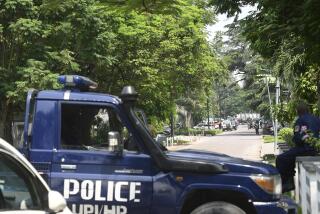Ivory Coast’s tenacious former leader captured
- Share via
JOHANNESBURG, SOUTH AFRICA — Ivory Coast’s longtime leader Laurent Gbagbo, who refused to relinquish power despite his defeat in a presidential election in November and a bloody battle with opposition forces, was seized from his compound in Abidjan on Monday and placed in the custody of United Nations peacekeeping forces, officials said.
The former president was shown on television being led into a room wearing an unbuttoned shirt and sleeveless white undershirt. Looking tired and wary, Gbagbo wiped his face with a towel before changing into a green-and-yellow shirt.
The capture came after Ivory Coast’s former colonial power, France, acting at the request of the United Nations, unleashed heavy overnight helicopter attacks at the presidential residence bunker where Gbagbo was trapped. French tanks closed in early Monday, but the arrest was made by forces loyal to Gbagbo rival Alassane Ouattara, the internationally recognized winner of the election.
“We attacked and forced in a part of the bunker,” one of the pro-Ouattara fighters, Issard Soumahro, told the Associated Press. “He was there with his wife and his son. He wasn’t hurt, but he was tired and his cheek was swollen from where a soldier had slapped him.”
Gbagbo, his wife, Simone, and son, Michel, were taken to the Golf Hotel, Ouattara’s political headquarters.
Daniel Bekele, Africa director of Human Rights Watch, said Gbagbo had been implicated in crimes against humanity and should be held accountable.
Gbagbo, a Sorbonne-educated history professor who ruled the country for a decade, will stand trial, said Youssoufou Bamba, the Ivory Coast’s ambassador to the U.N. in New York.
President Obama and other U.S. officials called Gbagbo’s capture a victory for democracy and the will of the people.
The fighting near the presidential residence stopped about lunchtime, witnesses said. Spontaneous celebrations broke out in some parts of Ivory Coast, particularly in Ouattara strongholds such as the city of Bouake.
But in the upscale neighborhood near Gbagbo’s residence, the mood was grim, according to one resident, who said many people in the area were afraid that local pro-Gbagbo activists would take revenge on the general population. Many residents there and in other parts of Abidjan had been trapped for more than a week, with little or no access to food.
“I just saw a lady who wasn’t happy at all,” said Issidore Kouadia, 24, who ventured briefly from his home in midafternoon. “She was screaming, angry. She was saying, ‘I don’t believe it. I prayed a lot for Gbagbo. If you tell me Gbagbo was captured today, it means my God is not a god.’ ”
Ivory Coast was thrown into crisis after the election in November. The balloting was observed and certified by the U.N., which declared Ouattara, a U.S.-educated economist, the winner with 54% of the vote. But Gbagbo refused to cede power.
In the standoff that followed, the two rivals both had themselves sworn into office and each appointed his own government.
Talks mediated by the African Union dragged on for months with no resolution. Gbagbo repeatedly rejected U.N. and African Union calls to stand down and rebuffed Ouattara’s offer of a deal offering peaceful exile.
Thousands of people were killed in the fighting and about 1 million people fled their homes, according to humanitarian organizations and the U.N.
Two weeks ago, Ouattara’s forces launched attacks across the nation and rapidly advanced to Abidjan, the nation’s commercial capital and largest city, where they met fierce resistance from Gbagbo loyalists.
As Gbagbo fighters attacked civilians, diplomats, U.N. peacekeepers and the U.N. mission, and invaded hotels abducting people, the U.N. launched its initial military action to destroy Gbagbo’s armed personnel carriers and heavy weapons.
At the time of his capture, many of Gbagbo’s top military officials and rank-and-file soldiers had deserted or changed sides, leaving only die-hard loyalists and militias to support him.
U.N. Secretary-General Ban Ki-moon said Monday that the military action was in accordance with a U.N. Security Council resolution that it use all necessary means to protect civilians.
“This is the end of a chapter that should never have been,” he said. “We have to help them restore stability, rule of law and address all humanitarian and security issues.”
Times staff writer Tina Susman in New York contributed to this report.
More to Read
Sign up for Essential California
The most important California stories and recommendations in your inbox every morning.
You may occasionally receive promotional content from the Los Angeles Times.










